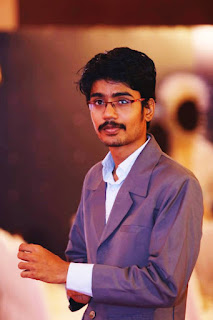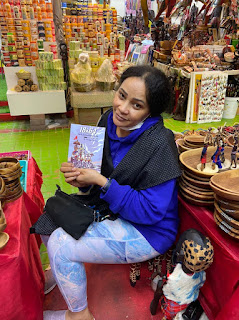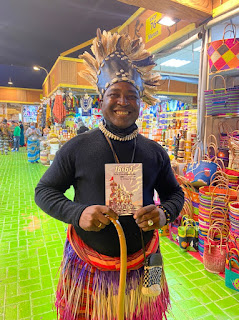Q: Your latest book has a huge and fascinating canvas. What is it about? Chess, history, love, Lucknow, kids, food, youngsters, humour... Senior citizens, culture...?
A: All. It's all linked through chess people! "Zih" happened specifically because of the chess players I met in Lucknow thanks to my contact with Chess Club Black & White (CCBW). I was surprised to hear about the deep cultural connection that Lucknow has with chess. It just had to be told. I still feel more could be written.
Q: How did you build the narrative? Are the characters real?
A: No author can be totally delinked from his human experience. That said, somewhere in the book, I lost track of all the characters. The fictional, historical, and the imaginary, all became too real. I enjoyed the process. I hope my readers do too. I sought permission from the real people to put them in the book as they are. It was essential to Karthik's journey. Initially, though, I had set out to only create a kind of historical record of chess players in Lucknow. My only intention was to make a website listing the names and a little about them. I just lost control. The book happened. Then, the surprising part is, it all also connects to India's Freedom Struggle. I found that super special and felt every chess player should know about this link.
Q: Both your novellas have women protagonists. Is there a reason for that? Is this a sequel?
A: Only one. Leila is one woman protagonist. In Zih, Karthik and Nawab Wajid Ali Shah are the male protagonists in the two separate timelines. The two books are not related. The numbering is just an idea based on chess notation.
Q: The bridging of 1856 and 2020 timelines — How did that happen?
A: Chess is so much a part of the Lucknow consciousness. Mention the word "shatranj (chess)" to a random stranger on the streets, and even if they have never touched a real chess set, they will immediately remark about Nawab Wajid Ali Shah, Premchand's iconic short story and the great Satyajit Ray film based on that. For me, the quirky personal connect happened when I found out that the Nawab was exactly my age when the British took over the Kingdom of Awadh in 1856. Then, back to the present, most of the children were whom I had met online during the lockdown. By some mysterious grace the characters and the novella just came to be.
Q: And, the Urdu poetry?
A: what can I say. That's not just about Urdu. You see, it's about the Lucknow air. The thing is either Lucknow makes everything romantic for you from having tea to meeting people or, it rejects you totally. Lucknow is a living city that embraces you with its passion if you are brave enough. Urdu is part of that passion. This I really cannot explain. (Smiles) Read my book, go to Lucknow and play a CCBW tournament!
Q: Both your novellas — 1. Leila# and 2. Zih-e-Lucknow# have free-spirited characters and you examine love, marriage and relationships in the non-traditional way. You project that love and relationships are not for keeps. Is that your observation of what is happening today?
A: I wouldn't say that's the correct interpretation. (Smiles). I do agree that I have witnessed a lot of fragile relationships around me. After all, relationships and career seem to be the focus in everyone's teens and twenties. However, what I want to say is, true love and committed relationships exist rarely because everyone's confusing physical or material attraction as love. I've tried to reach some kind of a definition for what is true love. I'm not sure I've succeeded. As my mentors say, I need to explore and study more and read more and I don't have any time to waste. I'm only a student. I need to work harder.
Q: Your mentors?
A: One is surely influenced by the people one meets. These can be through books we read, movies we watch or real people. International Master Akshat Khamparia, from Indore, is my teacher on and off the chessboard. Not only did he get me started on my Fide International Arbiter title, but his clarity of vision as an organiser is truly inspiring. No one can lead a team of polar opposite people as dynamically as he does. His Indore GM Open is going to be one of the great tournaments in the years to come like Moscow, London, Havana, St Louis, Hastings etc. His chess reflects that sparkling clarity as well. Then, GM Jonathan Rowson's books have had a profound impact upon me. GM Rowson's 100-year-project, Perspectiva, which is a collective of scholars, artists and activists working on "the pickle" through insight, praxis, realisation, and emergence is mind-boggling for me. I struggle to understand it but he's my modern philosophy hero. I hope I can be somewhat like him in the years to come both in chess and in thought. But, right now, I just have to study.
Q: And, cook?
A: (Laughs) Yes, as I say, in all my books. I think I was born to be a chef. The last letter just turned from "f," to a double "s" somehow. I do want to explore every single cuisine of the world. Again, I feel, I could have written more about the food in Lucknow.
Q: So, what next?
A: Hopefully, more studying, more writing, more chess, more meditation and more cooking.




















